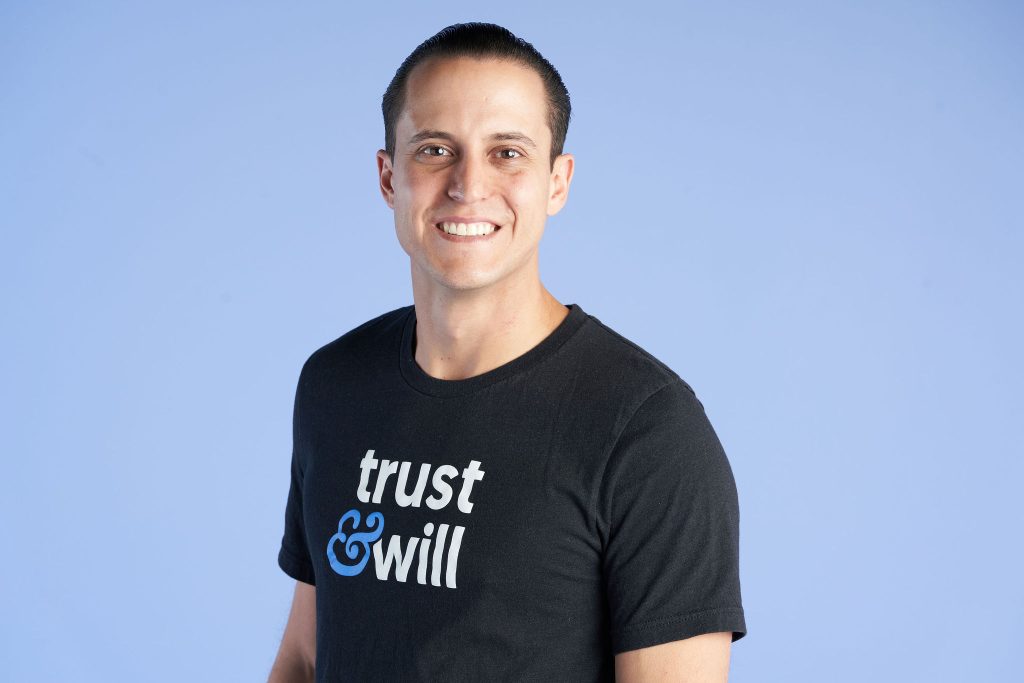
June 11, 2024
Q&A: How Trust & Will CEO Cody Barbo is Helping the 70% of Americans Without Wills Access Estate Planning
Trust & Will is a mission-driven tech company dedicated to expanding access to estate planning and settlement services. Trust & Will offers customized digital estate plan solutions tailored to fit individual needs, lifestyles, and budgets, making estate planning accessible for everyone. From inception to completion, Trust & Will’s online estate planning software platform guides users through the process of creating a will or trust, helping them secure their legacy and ensure their family and future are protected.
Data Catalyst Institute: What happens if someone dies without a will in place? Why do fewer than 30% of Americans have a will, and what is the biggest misconception people have about estate planning?
Cody Barbo: When someone dies without a will, their assets are distributed according to state laws, known as intestacy laws, which might not reflect their wishes. This can lead to potential conflicts among survivors and complicate asset distribution. Our study shows that only 36% of Millennials have an estate plan, reflecting a broader national trend where fewer than 30% of Americans have a will.
The biggest misconception about estate planning is that it’s only for the wealthy. Many fail to realize that estate planning is crucial for anyone who wishes to have a say in how their assets and responsibilities, such as the care of children, are handled after their passing.

DCI: You just released Trust & Will’s 2024 Annual Report, and T&W was part of Caring.com’s 2024 Wills and Estate Planning Survey. What does this research reveal about our country’s estate planning process?
CB: The research reveals that there is a significant knowledge gap in estate planning, with 56% of Millennials unsure of what happens to their assets if they die without a will. Despite this uncertainty, there is a growing awareness of the importance of having a will, particularly among younger generations like Gen Z, who are beginning to close the gap with older cohorts in estate planning engagement.
DCI: The Trust & Will Annual Report focuses specifically on Millennials, many of whom have faced financial instability since they were young. How does estate planning help secure families’ futures?
CB: Estate planning is crucial, especially for a generation that juggles financial instability and the responsibilities of the “sandwich generation.” By creating a will or trust, Millennials can ensure that their assets are distributed according to their wishes, guardians are appointed for their children, and special provisions are made for the care of elderly parents. This proactive step helps secure the future of their families and provides peace of mind in the midst of uncertain financial landscapes.
DCI: Some states have antiquated laws regulating estate planning, specifically requiring paper wills and wet signatures. What barriers still exist in the estate planning process?
CB: Trust & Will is committed to transforming the traditional, often cumbersome process of estate planning by advocating for laws that support digital innovation and accessibility.
Traditionally, creating a will or trust requires paper documentation and a “wet” signature, that is, a physical signature written in ink. This process not only demands physical presence and materials but also often requires an in-person witness and notarization. Coordinating as many as two witnesses and a notary be available at the same time and at the same location as the individual signing their estate planning document can be a barrier due to logistics issues, mobility, and/or financial constraints. The need for paper documentation can be particularly challenging in today’s digital age, where many people, especially younger generations, manage most of their financial lives online.
Modernizing estate planning laws to include digital options significantly enhances accessibility, making it easier for individuals to prepare for the future without the logistical and financial barriers associated with traditional methods. This would not only streamline the process but potentially increase the number of people who undertake estate planning, ultimately providing greater peace of mind and legal protection for individuals and their families.
DCI: How are Trust & Will’s public policy and advocacy efforts working to modernize these estate planning laws for the digital age?
CB: As a leading tech company in the estate planning sector, Trust & Will is actively advocating for the acceptance of electronic signatures, the use of remote electronic services, such as remote witnessing and online notarization, and the use of digital documents in the estate planning process. Our advocacy efforts are aimed at:
- Legislative Change: We work with lawmakers to increase understanding of the benefits of digital estate planning and to update laws that currently require wet signatures, physical presence, and paper records. Our goal is to make the legal acceptance of electronic signatures, remote signing, witnessing, and notarization, and the use of digital documents standard practice for estate planning in all states.
- Technology Integration: Trust & Will invests in secure, reliable technology that helps ensure the integrity and confidentiality of digital documents. By promoting and implementing technology that facilitates remote signing, witnessing, and notarization of documents, authenticates a person’s identity, and securely stores such digital estate planning documents, we help modernize the process, including making such services more accessible to a larger portion of the country, to reflect how people today can and want to use such technology safely and reliably.
- Public Awareness: We engage in public education campaigns to inform individuals about the benefits of digital estate planning. By explaining how these technologies can make estate planning more accessible, we hope to increase participation rates, especially among those who may have previously been deterred by the complexity of traditional methods.
- Collaboration with Legal Professionals: We collaborate with legal experts to ensure that our digital solutions align with current laws and regulations. This builds trust in digital solutions and encourages their adoption by both the legal community and the public.
Trust & Will is dedicated to leading this change, ensuring that estate planning is modern, efficient, and secure. Broadening access to estate planning means including everyone who needs to secure their legacy in the digital age.
DCI: Trust & Will partners with larger financial institutions and non-profit organizations, such as USAA, AARP, Navy Federal Credit Union, and UBS. How do these partnerships make estate planning more affordable and accessible to families?
CB: Our partnerships with reputable financial institutions and nonprofits play a critical role in making estate planning more accessible and affordable. By collaborating with these organizations, we can offer discounted services to their members, provide educational resources to demystify estate planning and encourage proactive financial wellness. These partnerships help extend our reach and impact, ensuring that more families have the opportunity to secure their legacies and protect their futures.
For a PDF version of this Q&A, please see here.

